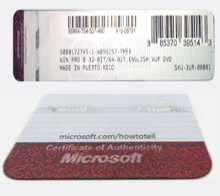Microsoft targets Israeli reseller in $1.3m 'fake Windows stickers' case

Did one Israeli reseller sell PCs with dodgy copies of Windows and fake authentication stickers, or is the company being mistakenly swept up in an effort by Microsoft to keep the issue of piracy in the international headlines?
Depends on who you ask, of course – and regardless of what either side says, an Israeli court is likely to be the one to decide if a local hardware vendor called One Systems Integration really did distribute PCs running illegal copies of Windows and carrying fake authenticity labels.

The accusations by Microsoft against One Systems Integration and its parent company One1 Software Technologies are the subject of a five million shekel ($1.28m) lawsuit now making its way through the Israeli court system.
In its complaint, Microsoft said that it had "concrete information indicating that the respondent was seriously violating the rights of the claimant" on an "ongoing basis and systematic manner", by selling computers with forged Windows authenticity labels, "on computers on which pirated versions of the claimant's products are installed without a licence". The computers in question, according to the lawsuit, came from HP, and were shipped to One Systems without Windows.
One Software is among Israel's largest hardware and enterprise software vendors, furnishing IT, BI, ERP, CRM, and other software to some of Israel's largest companies, and has won numerous awards – including awards from Microsoft.
A victim of piracy?
But the honeymoon appears to be over between the two. Dale Waterman, Microsoft's corporate attorney for anti-piracy for the Middle East and Africa, said that illegal Windows sales hurt not just Microsoft, but also vendors who follow the rules, and that Microsoft is one of the biggest victims of piracy in the world.
"People all over the world are making quick money from pirated and counterfeit software and their actions are adversely affecting local and global economies," he said at a recent conference on software piracy. "When companies use pirated software, it hinders job opportunities and stifles innovation. It is also just wrong to associate self with counterfeiting."
In a statement, Microsoft said that it had a network of investigators whose job it is to track down pirates who illegally duplicate Windows products, and that the investigators were the ones who had discovered the problems with One Systems, after buying several computers supplied by the company with phony authentication stickers.
"We are conducting our own investigation on this matter, but really no one here has any idea of what they are talking about" -- Adi Shein, One Systems
Sounds serious – but it isn't true, said Adi Shein, CEO of One Systems. "We really taken aback by this," he said. "We sell at least 10,000 units a year, mostly supplied by HP and Lenovo. From my understanding, Microsoft found four or five computers installed with Windows of questionable pedigree, and they claimed that we attached a phony authentication sticker to the machines. We are conducting our own investigation on this matter, but really no one here has any idea of what they are talking about."
Shein points to the company's long record of working with Microsoft. "We have spoken to our partners here in Microsoft Israel, and they have no idea what is going on either. They did not initiate this, and apparently the legal action is being initiated by a Microsoft unit abroad."
As to why Microsoft would want to make a mountain of a very small molehill, as Shein claims, the CEO said that it was either a case of bored lawyers looking to keep themselves busy, or an attempt by Microsoft to keep the issue of piracy in the headlines, possibly to discourage the real data thieves who make a living from fake Windows, Office, and other Microsoft products.
"Once every while, they come up with a lawsuit like this, which gets a lot of fanfare in the media, but very quickly dies out, with the case going nowhere. I am sure that will be the case here," Shein said.
Microsoft Israel, which distributed Microsoft's comments on the case to Israeli journalists, said it could not comment further on the matter.